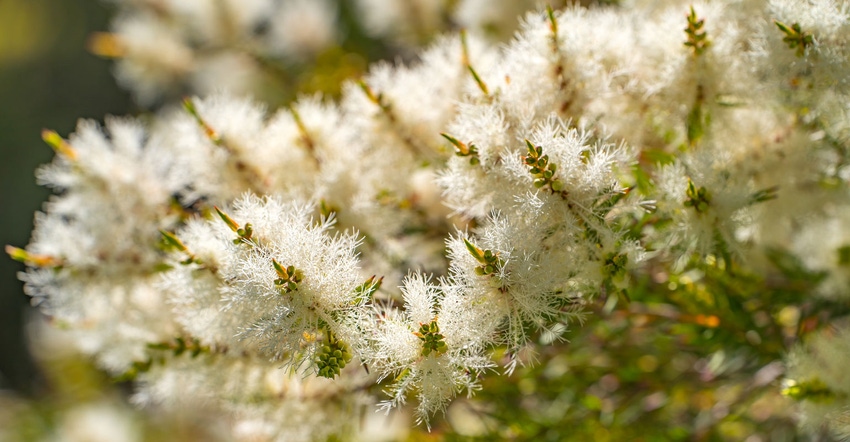June 1, 2022

To control crop pests, the crop protection industry is turning to a number of sources. One area showing potential is the use of botanicals, essentially natural chemicals, to protect crops. Summit Agro USA is launching Regev HBX, a hybrid fungicide, incorporating a botanical as a new mode of action for fungal and bacterial disease control.
The product, developed by STK Bio-Ag Technologies, is being marketed by Summit Agro in the United States. “We’ve worked with STK for some time,” says Eric Tedford, research and development manager for Summit Agro.
The new product, Regev HBX, is a combination of tea tree oil and difenoconazole, and targets three crops — soybeans, rice and pecans. “What we’ve done is optimize the formulation of Regev HBX to better fit the market in terms of economics for those segments,” Tedford says.
Regev HBX is bringing a new mode of action for disease control to those crops. “Recently, tea tree oil was classified by FRAC [Food Research & Action Center] as a BMO 1 product,” Tedford notes. “This is a classification that has a very low resistance risk.”
He says the low level of resistance is because tea tree oil contains multiple chemicals called terpene hydrocarbons that have different modes of action against fungal and bacterial plant pathogens. One mode of action disrupts the pathogen’s cell membranes, which imparts activity against both fungal and bacterial plant pathogens.
Tea tree oil has also been reported to induce disease resistance in plants. This action — called Induced Systemic Resistance or Systemic Acquired Resistance (the two are different) — pushes the plant’s built-in systems for fighting off disease. Tedford says more research is needed there, but it has been demonstrated in other crops like bananas and tomatoes.
Multiple actions at work
A botanical-based biological is different than biologicals based on living organisms like bacteria. In the case of tea tree oil, the complex natural chemical brings forth several actions when taking on bacteria and fungi impacting crops, Tedford explains.
He says tea tree oil has multiple mechanisms of activity:
inhibits sporulation and spore germination, which prevents infections from starting
disrupts cell membranes of both fungal and bacterial plant pathogens
inhibits respiration, ion transport and mycelial growth, which prevents disease spread
hinders quorum-sensing bacteria, preventing bacterial infections
The difenoconazole component of Regev HBX is curative, while the tea tree oil delivers preventive, curative and anti-sporulant activities.
Targeting disease
Key diseases for Regev HBX include frogeye leaf spot and Asian soybean rust in soybeans. While the latter is not a big problem in the United States, the former is showing resistance to strobilurin compounds in some parts of the country.
For pecans, Tedford says scab is the main target. “Growers usually treat every 14 days, and we recommend that,” he says, but he’s not recommending an all-Regev HBX approach. “This can be worked into a program as a change in mode of action during the season.”
He says when planning the program, growers need to keep in mind the product FRAC groups and alternate chemistries for resistance management. Many fungicides in the market today contain either a strobilurin, triazole or carboxamide chemistry. Tea tree oil adds a new low-risk option for growers. You still need to consider other chemistries when using Regev HBX in your program. “Our label reads like any fungicide label, and you want to rotate chemistry,” he says.
And for rice, the target is rice blast. Regev HBX brings a new approach to that disease, too.
As a botanical, this product requires no special handling rules, Tedford points out.
Regev HBX is available exclusively from Helena Agri-Enterprises and Tenkoz member companies. Learn more at summitagro-usa.com.
About the Author(s)
You May Also Like






